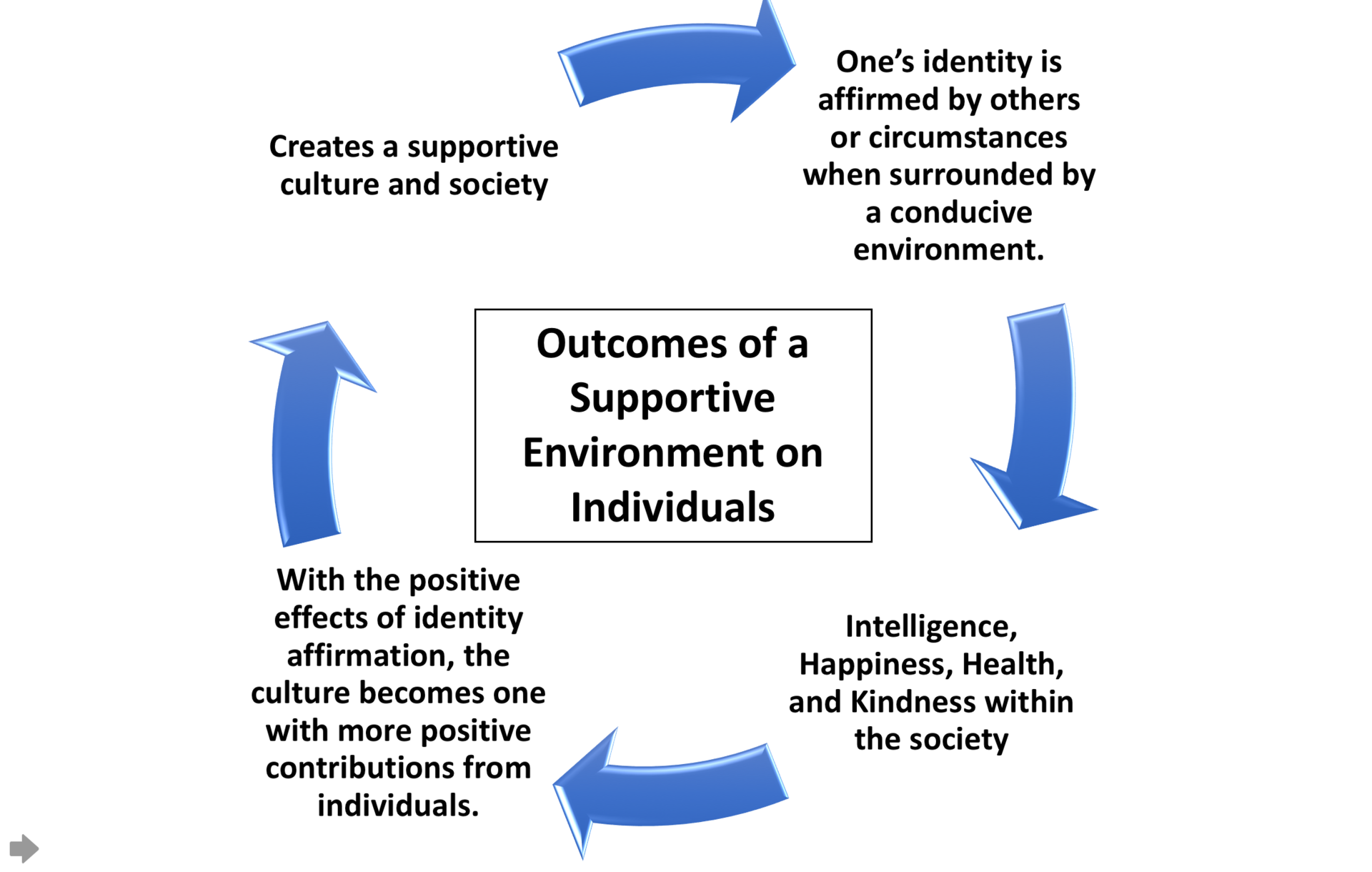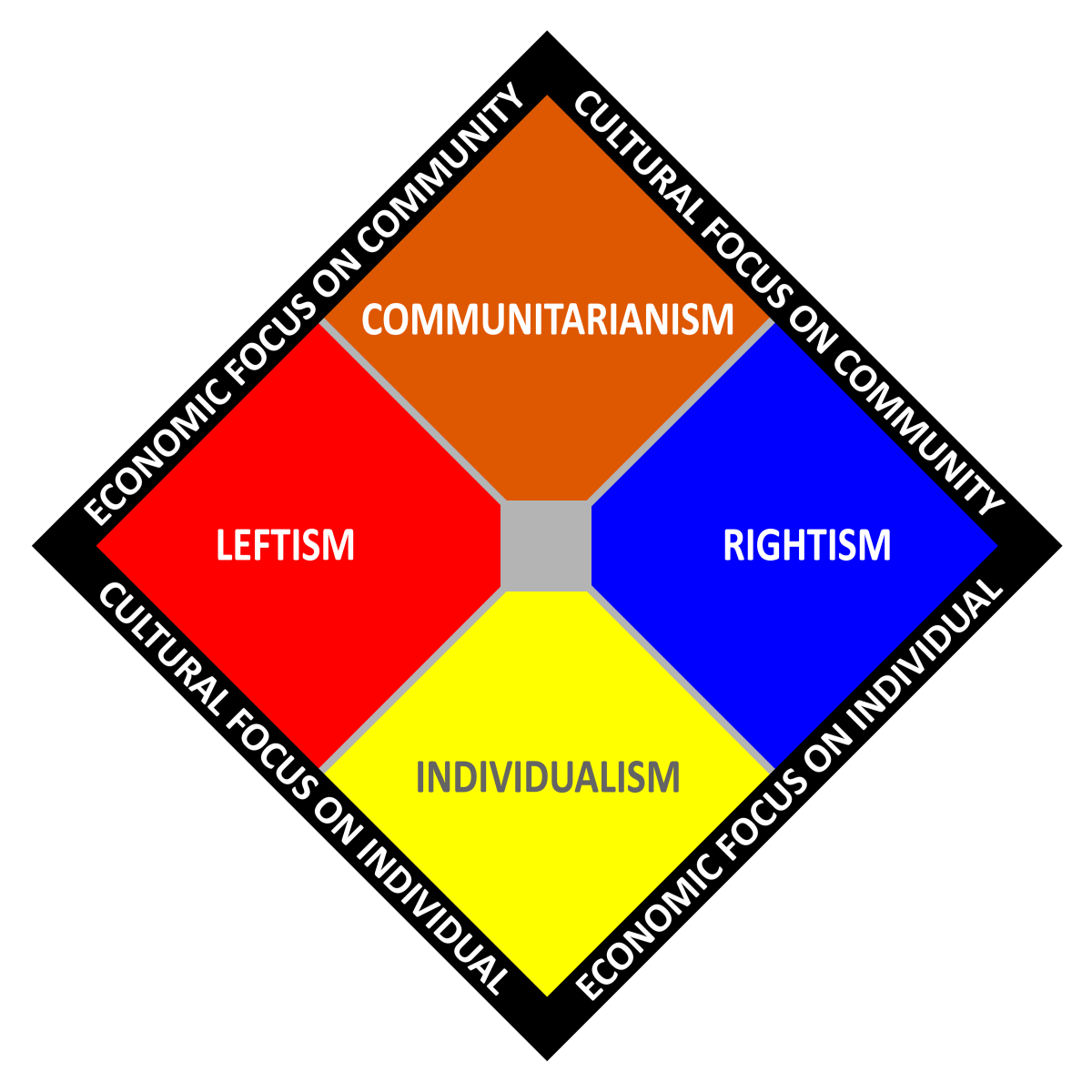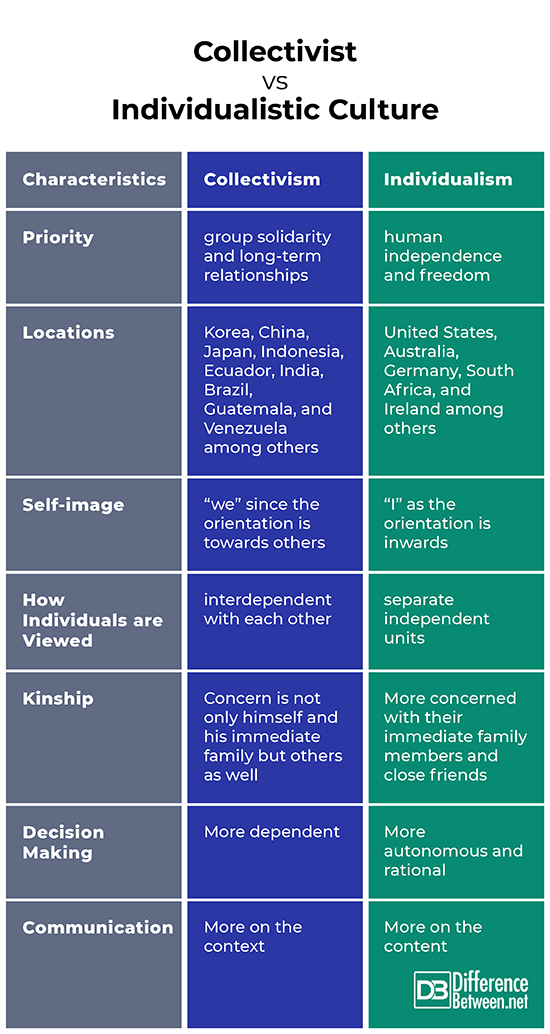Difference Between Collectivist and Individualistic Culture
Both collectivist and individualistic cultures are concerned with how individuals in a society prioritize and manage their relationships and goals. They are often viewed as being in contrast with each other. Collectivist cultures value group cohesion over individual pursuits, and it sees long-term relationships as vital since it promotes group aims. On the other hand, individualistic cultures focus on autonomy. The following discussions further delve into these distinctions.

What is Collectivist Culture?
Collectivist culture is characterized by prioritizing group solidarity over individual goals. It sees long-term relationships as important since it fosters the community’s objectives. The members of a people in a collectivist society can easily sacrifice their individual benefits for the sake of the whole society’s progress. They do not view individuals as independent units; they perceive them as interdependent with each other. Each person’s orientation is toward the group instead of toward himself as the self-image is defined as “we”. An individual’s concern is not only himself and his immediate family but others as well. In exchange, others can also be depended on in times of need. Hence, kinship and community are highly essential.
Certain behaviors are associated with this culture. Generally, other members of the group should first be consulted when making major decisions. Moreover, collectivist cultures focus more on the context than on the content of the communication. For example, elements such as tone of voice, eye contact, facial expression, and position of body are more accurate indicators of how a person is feeling that what he is actually saying. In addition, members of a collectivist society value links with their past as evidenced by their interest in genealogies and events like reunions. This cultural pattern is commonly observed among traditional communities. Countries which are classified as collectivistic include Korea, China, Japan, Indonesia, Ecuador, India, Brazil, Guatemala, and Venezuela (Cherry, 2020).

What is Individualistic Culture?
Individualistic culture focuses on human independence and freedom. Societies with individualist cultures disagree that tradition, the church, and other social agencies can dictate a person’s limitations. It opposes the principles of collectivist cultures which prioritize tradition and group goals. Hence, a person is positively viewed if he is assertive and independent.
Members of individualistic cultures focus on individual rights, uniqueness, and self-reliance. For instance, a member of this society may describe himself using personal characteristics such as “logical”, “competitive”, and “unique”. On the other hand, someone from a collectivist culture may use adjectives such as “dependable father”, “loyal employee”, and “caring leader”.
Some of the countries which are described as individualistic include the United States, Australia, Germany, South Africa, and Ireland (Cherry, 2020). However, it has been observed that there is an increasing trend of individualistic cultures across nations and that this may be associated with the improvement of socioeconomic status. It is then implied that an improvement in one’s financial and social status is linked with being autonomous and the motivation to achieve individual pursuits.
Difference between Collectivist and Individualistic Culture
Priority
Collectivist culture is characterized by prioritizing group solidarity over individual goals. It sees long-term relationships as important since it fosters the community’s objectives. On the other hand, individualistic culture focuses on human independence and freedom.
Locations
Countries which are classified as collectivistic include Korea, China, Japan, Indonesia, Ecuador, India, Brazil, Guatemala, and Venezuela. In comparison, some of the countries which are described as individualistic include the United States, Australia, Germany, South Africa, and Ireland
Self-Image
The self-image in collectivist cultures is characterized as “we” since the orientation is towards others. On the other hand, the self-image in individualistic cultures is in terms of “I” as the orientation is inwards.
How Individuals are Viewed
Collectivist cultures perceive individuals as interdependent with each other while individualist cultures see people as separate independent units.
Kinship
Kinship and community are highly essential in collectivist cultures. An individual’s concern is not only himself and his immediate family but others as well. In exchange, others can also be depended on in times of need. On the contrary, those in individualistic cultures are generally more concerned with their immediate family members and close friends. Hence, when an individual faces a challenge, he is mostly expected to be self-reliant.
Making Decisions
Generally, other members of the group in collectivist cultures should first be consulted when making major decisions. They tend to be more dependent and loyal to their more central ingroups. In comparison, the members in individualistic cultures are often more rational in making decisions (Le Febvre, Rebecca & Franke, 2013). They are also observed to be more autonomous in their choices and disagree that factors such as tradition and religion should limit a person.
Communication
Collectivist cultures focus more on the context than on the content of the communication (Triandis, 2001). For example, elements such as tone of voice, eye contact, facial expression, and position of body are more accurate indicators of how a person is feeling that what he is actually saying. Au contraire, the members of individualist cultures have been observed to be more vocal and direct to the point with what they think and feel.
Collectivist Vs Individualistic Culture

Summary
- Both collectivist and individualistic cultures are concerned with how individuals in a society prioritize and manage their relationships and goals.
- Collectivist culture prioritizes solidarity over individual goals while individualistic culture focuses on human independence and freedom.
- The self-image in collectivist cultures is characterized as “we” while that of individualistic cultures is in terms of “I”.
- Collectivist cultures perceive individuals as interdependent (as observed in decision making habits) while individualist cultures see people as independent units.
- Unlike in individualist cultures, kinship and community are highly essential in collectivist cultures.
- Members of individualistic cultures focus more on the content than the context of communications.
- Difference Between Hematoma and Melanoma - February 9, 2023
- Difference Between Bruising and Necrosis - February 8, 2023
- Difference Between Brain Hematoma and Brain Hemorrhage - February 8, 2023
Search DifferenceBetween.net :
Leave a Response
References :
[0]Cherry, K. (2020). Individualistic cultures and behavior. Very Well Mind. https://www.verywellmind.com/what-are-individualistic-cultures-2795273
[1]Cherry, K. (2020). Individualistic cultures and behavior. Very Well Mind. https://www.verywellmind.com/what-are-individualistic-cultures-2795273
[2]Le Febvre, Rebecca and Franke, Volker. Culture Matters: Individualism vs. Collectivism in Conflict Decision-Making. Societies, 2013, 3, 128–146; doi:10.3390/soc3010128
[3]Triandis, H.C. Collectivism: Cultural Concerns. International Encyclopedia of the Social and Behavioral Sciences, 2001, 2227-2232.
[4]Image credit: https://sco.wikipedia.org/wiki/File:Political_Spectrum_Chart_NPOV.svg
[5]Image credit: https://en.wikipedia.org/wiki/Cultural_psychology#/media/File:Positive_Example_of_Mutual_Constitution_in_Society.png
